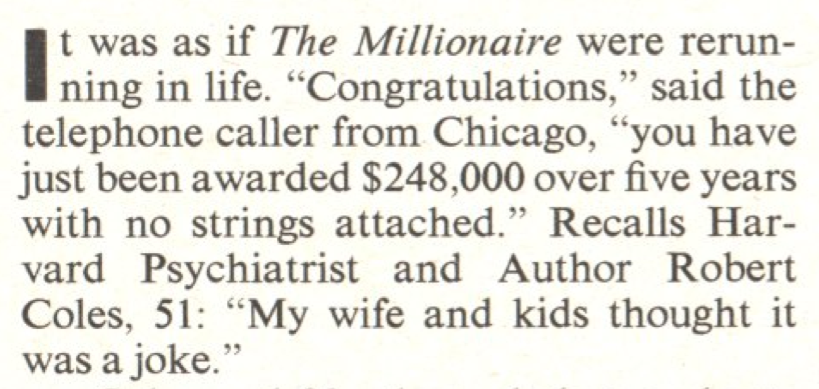
The Wednesday announcement of this year’s recipients of the MacArthur Foundation “genius grants” was big news for cartoonist Alison Bechdel, activist Ai-jen Poo, filmmaker Joshua Oppenheimer and the 18 other men and women the Foundation had selected. Each will receive a stipend of $625,000 over five years, with no strings attached.
To be named a MacArthur fellow is, these days, to receive one of the most prestigious honors out there. The rules are both vague and broad—all residents or citizens of the U.S. who don’t hold government offices are in the running, and the nomination process is hush-hush—but any artist, scholar or otherwise talented or creative person would be overjoyed to receive the fateful call from the foundation.
In 1981, however, the situation was a little different. For the first round of recipients, who included physicist Stephen Wolfram and author Robert Penn Warren, being told they’d get hundreds of thousands of dollars was a little harder to believe. (The prize amount was around $250,000 at the time, with the exact amount given each year determined by the age of the recipient.) Giving away such a huge amount of money, with no application process and expecting nothing in return, was unheard-of in the grant-giving world.
So where did such a wacky idea—and the money to make it happen—come from?
Here’s how TIME explained it in a June 1, 1981, article about the “new talent search begun by Chicago’s John D. and Catherine T. MacArthur Foundation” that aimed to find “creative people and [help] them to make ‘discoveries or other significant contributions to society'”:
The 2½-year-old MacArthur Foundation is the creation of the late John D. MacArthur, an eccentric who became a billionaire in the insurance business. With assets estimated at $862 million, the foundation is the nation’s fourth largest, surpassing Rockefeller, Carnegie and Sloan, trailing only the Ford, Robert Wood Johnson and Andrew W. Mellon foundations. The rationale for the no-string fellowships is the argument that important breakthroughs in the past have been the work of lone geniuses devoid of grantsmanship. Said Foundation Director J. Roderick MacArthur, 60, John’s son, in accepting the proposal: “My father believed in the individual as opposed to the institution. This captures that spirit—the risky betting on individual explorers while everybody else is playing it safe on another track.”
And what did the Foundation expect to come of it? For the majority of recipients, merely to honor their talent—on the off chance that a minority would do something more with it, explained Roderick MacArthur: “If only a handful produce something of importance—whether it be a work of art or a major breakthrough in the sciences—it will have been worth the risk.”
Read the full 1981 article here, in TIME’s archive: Prizes With No Strings Attached
More Must-Reads From TIME
- Dua Lipa Manifested All of This
- Exclusive: Google Workers Revolt Over $1.2 Billion Contract With Israel
- Stop Looking for Your Forever Home
- The Sympathizer Counters 50 Years of Hollywood Vietnam War Narratives
- The Bliss of Seeing the Eclipse From Cleveland
- Hormonal Birth Control Doesn’t Deserve Its Bad Reputation
- The Best TV Shows to Watch on Peacock
- Want Weekly Recs on What to Watch, Read, and More? Sign Up for Worth Your Time
Write to Lily Rothman at lily.rothman@time.com